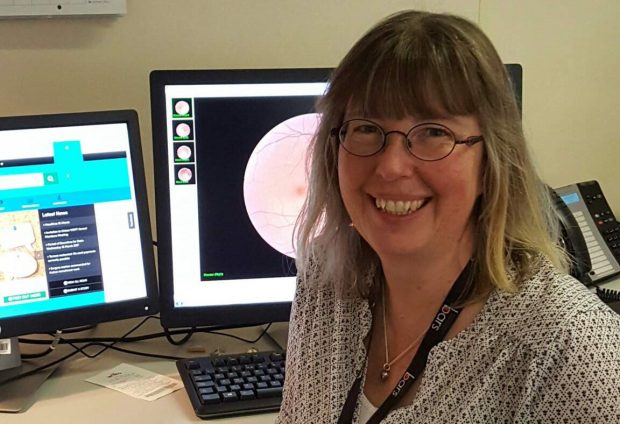The Level 3 Diploma for Health Screeners is now a requirement for all non-clinical screening staff in the abdominal aortic aneurysm (AAA), diabetic eye (DES) and newborn hearing (NHSP) programmes.
The diploma gives staff the knowledge and skills they need to work in a healthcare setting. And they can use it to support career progression and personal development.
Learners are assessed in their normal working environments and their portfolio of evidence contains examples of their real work with patients. The assessors play a vital role in verifying that learners are competent in their roles.

I’ve worked in diabetic eye screening for 12 years, working my way up to my current role of grading manager. I’m an assessor of DES learners and previously assessed learners studying the City & Guilds diploma. Recently I undertook the Level 3 Certificate in Assessing Vocational Achievement (CAVA) qualification so I can assess staff undertaking the new health screeners diploma.
I studied for the CAVA with the National Open College Network and found it very rewarding and positive. It took me about 4 months to complete, although it could have been quicker if I’d really thrown myself into it!
Before enrolling on the CAVA I needed to provide evidence that I met the course criteria. On enrolling I was provided with the course information and a book called ‘The Best Assessors Guide’ by Hilary Read. My assessor, a very nice lady called Jackie, then ran through the process with me and I was sent a ‘skills scan’ to complete.
A skills scan is used to identify previous and current experience and activities which match the requirements of the qualification. This information is then used to develop an individual assessment plan.
On the face of it, it all looked a bit daunting. But once I got into it I realised much of the terminology applied to skills I already had but hadn’t put a name to. For example, a ‘holistic’ assessment means looking at a task as a whole, allowing different aspects to be assessed. And I use a holistic approach when assessing screeners in the administration of eye drops before diabetic eye screening because I look for evidence that shows good hand hygiene, working relationships and health and safety.
Providing evidence of my skills and experience was relatively straightforward. I contacted 2 screeners I’d previously assessed and took a copy of their assessments. I also contacted 2 colleagues who confirmed via an ‘expert witness statement’ that they’d worked with me and seen me carry out assessments. I also used ‘The Best Assessors Guide’ as reference to provide evidence on a couple of other topics. Finally, and probably most scarily, I had a taped telephone conversation with my assessor. Don’t get me wrong, Jackie was lovely, but knowing you’re being taped can make you very nervous and make your mind go blank, or perhaps that’s just me?
That was it in a nutshell really. My assessor was really helpful and if there was an area I hadn’t covered she pointed me in the right direction and made suggestions.
I now feel much more confident and professional when assessing. I have a good understanding of the different assessment tools I can use and appreciate the importance of providing good evidence, both for myself and, as an assessor, for the learners too.
Once completed the CAVA is totally transferable and can be used to assess any area of work, not just diabetic eye screening. Assessors are used in colleges and businesses alike. So who knows what the future may hold?
PHE Screening blog
PHE Screening BLOG articles provide up to date news from all NHS screening programmes – replacing our previously published newsletters.
You can register to receive updates direct to your inbox, so there’s no need to keep checking for new blog articles.